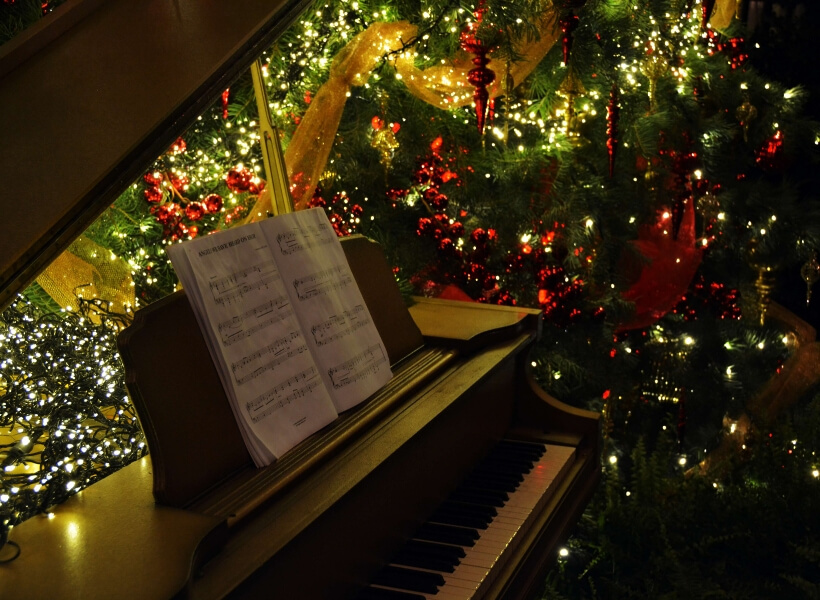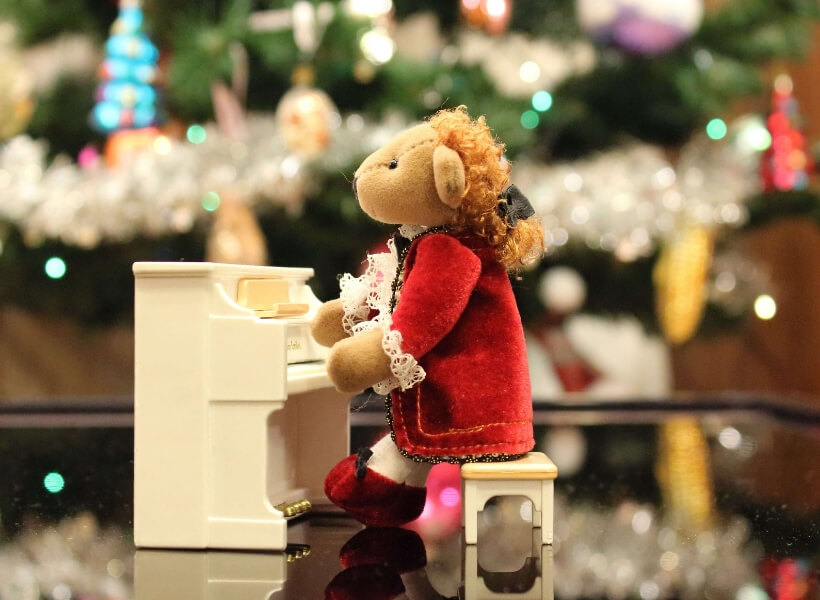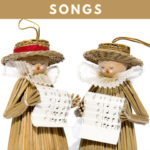Category: Christmas in France
Annie Sargent 0:00
This is Join Us in France Episode 217. Bonjour, I’m Annie and join us in France is the podcast where we talk about France, it’s many qwirks, its history, its language, and of course itineraries and destinations in France you want to hear about because hopefully you’ll be visiting soon!
On today’s episode: French Christmas songs. Did you know that there are quite a few songs that you probably know in English that originated in France? Every time I prepare a new episode, I think of the people who will be listening to it.
I tried to picture you wondering what might lift your mood. And of course, tell you cool things about France. And since this is the Christmas season, I thought, well, one of the things that lifts my mood is Christmas songs. And I also wonder how many of you are a French descent? Because if you are, you can be sure that your ancestors sang some of these songs around the fireplace and at church and around their villages. Because the songs are so old, we don’t really know very much about their origin. And we’ll see you’ll see about that in a second.
Join us in France is brought to you by Patreon supporters and Addicted to France, the small group tour company for people who want to enjoy France to the fullest with a couple of natives such as Elyse and yours truly. T sale of the 2019 Dada new tour closer closes in a few days, check out addicted to France, calm for our latest offering.

Martha Sargent 1:59
Hello Martha and welcome to Join Us in France!
Thank you Annie, I’m looking forward to this conversation.
Annie Sargent 2:06
Yes, I do, too. So let me introduce Martha just a little bit. Martha is my mother in law. And she has been a wonderful mother in law. And she is also an amazing musician. And she has a master’s degree in choral conducting, right?
Martha Sargent 2:25
Yes.
Annie Sargent 2:26
And you have… a you’ve been the conductor of the Baroque, the Utah Baroque Ensemble for 32 years. And that choir is unbelievably good. I must admit, we went to hear you sing in Germany this summer. And you guys sound fabulous.
Martha Sargent 2:47
Oh, thanks! It was delightful to sing in those cathedrals that are so famous and such amazing acoustics.
Annie Sargent 2:58
Right. And, you’re also the conductor of the Christmas chorus. And that has been going on for 39 years. And that’s, that’s a choir that meets just for the Christmas season to put on a few? Two concerts?
Martha Sargent 3:15
Yes, yeah.
Annie Sargent 3:17
Two concerts. And when I lived in Utah, I participated for a few years. But it’s a lot of work. That one is also a lot of work. And you sing… and usually when I was there we would sing a French song sometimes, not always, but but you see a variety of things.
Martha Sargent 3:38
Yes in a lot of different languages, it’s been fun.
Annie Sargent 3:43
Yeah, okay. So let’s talk about why we… How did we get Christmas songs to begin with?
Martha Sargent 3:50
Well, the Christmas carols come from… Actually a carol originally was a dance, and then the singing with the dance and then the singing has gone on. Has been passed down for many years more than the dancing.
But, they come… Most of the most the carols that we will do, that you’ll be playing for people are really folk carols. And of course someone had to begin with the melody some of the melodies these come from an instrumental tune or a drinking song or something else that that people knew. And then they put words to it to celebrate Christmas.
And and they get passed down. And so they they change some, but these ones that we have today have existed for hundreds of years.
Annie Sargent 5:03
Right. The first one we’re going to play is called Entre le boeuf et l’ane gris, and it’s one of the earliest Carol’s that we still sing today. It dates back from the early 1500s. So that’s the very end of the Middle Ages. It’s a long time ago. And for some reason it has survived. I mean, it must have been one that people particularly liked that they kept on singing year after year.
Martha Sargent 5:31
Yes, it’s tender, singing the baby to sleep with the animals around. And it’s a scene that people like it’s a pretty easy tune.
Annie Sargent 5:48
Okay. So before I play that for you, I have to say, we did not do very much practicing when we recorded this. So. So this is an interesting family. Because I was raised in a new musical family. My, my grandfather was a marching band conductor, and apparently could play all sorts of instruments. And my father didn’t do any music. But then my brother had an uncanny ear for, for tunes. And so you could play him the radio and you he could play it on the piano, which we always thought was magic.
As a result, we, we spent a lot of time growing up with my brother at the piano and the rest of the family singing. And then I married into a family of professional musicians, because you Martha are a choral conductor. Your husband is a composer. And has been a professor for many years. And so it was very interesting to be again in a in a musical family but one that was a lot more serious!
Because on my side me it’s mostly silliness. So anyway, we got together in July and we we decided we wanted to do an episode for for Christmas. And so we recorded a few things. So this is not professional singing by any means. But I would like to explain that my my father in law is at the piano. My brother is on the trumpet. His daughter who’s 12 is playing the viola. You Martha you conduct, you sing and you played the recorder.
Martha Sargent 7:35
Yes, and that just meant that sometimes we have to chase the trumpet far away so that the rest of us could be heard. So I was trying to keep us together. Spread out over two or three rooms!
Annie Sargent 7:51
Right. Because the trumpet he had a silencer. My brother brought a silencer. No, he didn’t bring a silencer. That’s what it was. And so he was trying to do it with a hat or something. And it wasn’t working.
Martha Sargent 8:02
That’s usually called a mute in English.
Annie Sargent 8:04
A mute. Sorry. Yeah. Oh, yeah! A silencer is for a gun, isn’t it?
I’m sorry. I didn’t mean that my brother is a …
Martha Sargent 8:15
Shooting his trumpet at us!
Annie Sargent 8:19
So um, so yeah. So it was kind of complicated. And we did the best we could. And of course, again, we have one side of the family, my brother who just plays by ear and then the musicians wanted to write things out because that’s what they do.
So it was kind of funny. Anyway, some of these tunes sound lovely anyway, even though we were not very well practiced. We had great fun doing it. And I I was listening to them again, just a few days ago to put together this this episode. And I was grinning from ear to ear, so I hope you do too. So here you go. Here’s the first one Entre le boeuf et l’ane gris. Is that one translated in English? Do you know an English title for that one?
Martha Sargent 9:08
I don’t know an English title.
Annie Sargent 9:09
Okay.
Martha Sargent 9:11
The cow and. And the gray. Sheep
Annie Sargent 9:15
Donkey, donkey. “Ane” = donkey.
Martha Sargent 9:20
Ane, sorry, OK.
Annie Sargent 9:20
Alright, let’s, let’s play that one.

So now let’s talk. Hopefully you survived this one. Let’s talk about the second one called Il est ne le divin enfant. So again, I’m going to ask you to set the same question: does does that one have an English title? I couldn’t. I didn’t find one.
Martha Sargent 10:52
Yes, usually he’s born. Oh, he is born. Right.
Annie Sargent 10:56
Okay. So this one I from what I read it was hunting song originally from the late 1600s
Martha Sargent 11:05
That’s because the tune is the kind of thing you can play on a hunting horn.
Annie Sargent 11:14
Ah! Because it’s simple enough?
Martha Sargent 11:17
Yeah, it has the intervals that a horn without any valves could play easily
Annie Sargent 11:23
There you go. That makes sense. So the text we sing today is from the 1800s and that’s about all I know about it. It’s surprising how little we know about some of these songs, isn’t it?
Martha Sargent 11:36
Yes. But that’s because they, they they weren’t reported in, you know, written down and a composer and an author cited. They’re just just passed around through families and communities.
Annie Sargent 11:55
Mm hmm. Alright, let’s listen to Il est ne le divin enfant.
Alright, the next one is Noel nouvelet. O Sing We Now of Christmas. Do you have anything you know about this one? Because I know zero about this one!
Martha Sargent 13:22
I don’t think so.
Annie Sargent 13:24
Yeah.
Martha Sargent 13:26
It’s one that my family liked a lot that we sang growing up.
Annie Sargent 13:31
Yeah,
Martha Sargent 13:32
As my mother taught us Carols. She
Annie Sargent 13:36
Yeah. Your mother taught me French carols! It was so surprising. The first Christmas I spent in the family. She, you know, sang these songs for me. And I was like, you know, I don’t know this one. I think in France, French people sing a lot of tunes that are from America, the American tradition. I mean, you know, Jingle Bells and Sleigh Ride and things like that. They got translated into French. And we we sing those more than the old traditional carols, which is too bad.
Martha Sargent 14:16
I think that’s true in America, as well. Those of us involved in choral music, tend to get into carols, and there’ll be lots of different arrangements of them that make them fancier than just to sing the melody. But a lot of even a lot of them American and English carols, and I know most most people don’t.
Annie Sargent 14:44
Yeah
Martha Sargent 14:46
The folk traditions are not as strong as they used to be.
Annie Sargent 14:50
Right, right. We all listen to the Mariah Carey kind of Christmas songs.
Martha Sargent 14:57
Yes, we get our our perfect recorded music and members of a family listen to each person what they like, rather than producing music together themselves. And that’s, that’s carries the folk tradition.
Annie Sargent 15:15
That’s true. Yeah, because this was not an option long, long ago, in France. You know, these are songs that got sung in villages where they had never seen a professional musician. It was all the music they had was whatever music they could produce.
Martha Sargent 15:33
Right. And, and not much written down.
Annie Sargent 15:37
Right,
Martha Sargent 15:41
Special things that that individuals loved became known in the communities and then passed around to to families and other communities.
Annie Sargent 15:55
So with this one, we’re going back in time, just a little bit. This is the probably the late 1500s. So again, this is Noel nouvelet or Sing We Now of Christmas.
All right. Les anges dans nos campagnes. Angels We Have Heard on High
Martha Sargent 17:37
This is one that most people in lots of different countries would know. It has become part of the global tradition, I guess.
Annie Sargent 17:50
Yes. Yes.
Martha Sargent 17:52
With Silent night, some of the others.
Annie Sargent 17:57
Yes. And this one. So the reason why we know more about this one is because it was published in 1843. For the first publication that they find where they just said, It’s from the Languedoc so Languedoc is, is where, well, close to where I live in the south of France. And it was included in several music books. This is when they started publishing books with music in them. And so this was 1846 – 1846. And it was probably composed in the late 1700s, but we don’t know the detail of who wrote it, but at least we have a, you know, a record of it being published at one point.
Martha Sargent 18:41
Yes, yes. And that makes a big difference if it was published early, and then people liked it and it…
Annie Sargent 18:50
Mm hmm. And this would be a good time to mention one we didn’t record. I don’t remember if we even tried to record it and it didn’t work out but it’s Minuit chretiens Oh, holy night. That’s also a French song
Martha Sargent 19:06
Right. And and and that we know the composer and the author and
Annie Sargent 19:14
Right
Martha Sargent 19:14
Yes. Very famous one.
Annie Sargent 19:17
Yeah. Yeah. Okay. Let’s listen to Les anges dans nos campagnes
Martha Sargent 21:19
Now I tell me which one that is.
Annie Sargent 21:23
Dun dun dun dun dun dun dun.
Martha Sargent 21:27
Oh, I got it! OK.
Annie Sargent 21:27
Yeah? So this one is a traditional Occitan Carol so this is exactly from the Toulouse area. This is one that I’ve heard sung in churches in Occitan around here all the time. This is one that my husband participates in choirs around here. And they often sing it. And so it’s funny because in the recording he actually says the words better than I do! Because he’s done this with choir’s that he has more practice. For me. I was just reading the words going oh, my Occitan is really bad! But it’s such a fun song. It’s upbeat. And I think that’s one of the reasons why it has survived is because, you know, in the winter we we like cheerful music, I guess.
Martha Sargent 22:15
Sure. And that little refrain mimics trumpet Yes, and the drum that it sings about.
Annie Sargent 22:28
Yes. And it talks about how people come to perform “Aubadas” which which. In French today we still have that word “une aubade”. And it just means a very short informal concert. So for instance if you if a choir is going to be singing for a an official event like the November 11 or something like that, they will usually go and sing La Marseillaise, so the national anthem, and then they will do a short version short Aubade, which just means they will sing one or two songs. And, and so I guess it worked kind of like caroling because people would
Martha Sargent 23:12
That’s what I was thinking!
Annie Sargent 23:14
Right, they would go around. It’s usually outdoor. So I assume that people would go sing their Aubade around villages and places like that. And the song talks about that it says, you know, we’re going to sing an Aubade. And we’re and we’re going to play our trumpet. And our recorders. And one will play this line. And then the other way we respond with this line and they will say, beautiful child, we’ve come to sing Noel for you, and the angels will help us sing.
So like like in a lot of other… while this one it’s clear that they’re singing to the baby Jesus. But in a lot of carols, I find that really everything you’re saying could apply to any baby
Martha Sargent 23:59
Yes.
Annie Sargent 23:59
Like, you know it’s often about how sweet the baby is how beautiful the baby is how peaceful it is that sort of thing.
Martha Sargent 24:08
He’s asleep or something.
Annie Sargent 24:09
Right.
Martha Sargent 24:09
But if it mentions Mother Mary or animals or the angels and then that puts it directly with Jesus but you still it can it can feel like it applies to your own child
Annie Sargent 24:26
Right and that’s probably why Christmas carols are so touching to people. It’s because even people who are not particularly religious they’re lovely songs that talk about babies!
Martha Sargent 24:41
Yes. You know, even people who are not terribly musical probably still sing a lulabye to their baby.
Annie Sargent 24:48
Right.
Martha Sargent 24:49
And know what that feels like.
Annie Sargent 24:50
Yeah
okay so let’s hear Nadal Tindaire

All right, let’s move on to La marche des rois which in English is?
Martha Sargent 26:00
The March of the Kings
Annie Sargent 26:03
Right. So this one is a traditional song from Provence and it was made really famous by Bizet in a piece he wrote called L’Arlesienne, so that’s the girl from Arles. And for a long time I thought L’Arlesienne was an Opera because Bizet is famous for Carmen. But yes, it’s not a full Opera
Martha Sargent 26:26
Yes, as well as other things that we don’t know as well. But yeah. It’s incidental music. And there actually are two different suites of pieces from the incidental music that he wrote the March is it’s in the more famous suite.
Annie Sargent 26:46
Yeah, it’s super famous. Everybody has a hard the tune I think. It was originally written to accompany a theatrical performance of a play by Alphonse Daudet. So this is this made me smile as well, because he’s a famous author. And he wrote a lot of pieces that take place in Provence, and he wrote some of the cutest little children’s stories
You know about the about the goat who wanted to escape all the time. And so the, the well meaning farmer kept I mean, had to tie her down, but kept on giving her a longer and longer rope. Until one day the rope was so long that the goat went all the way up in the mountain and get eaten by the wolf.
Martha Sargent 27:31
Oh,
Annie Sargent 27:33
Yes, I know. I know. But, you know, I mean, children’s stories used to not be so
Martha Sargent 27:39
So happy ending all the time.
Annie Sargent 27:40
Yeah, yeah. Yeah. Daudet definitely wrote like, Children stay close to your house. This was…
Martha Sargent 27:49
Yes, I was going to say, a lot of those stories are are trying to teach the child something that you want. Right, right. And there’s danger if you do this, or that,
Annie Sargent 27:58
Right. And this one talks about the three kings arriving with their gifts for the baby Jesus. Let’s listen to that one.
All right. Now, look, the last one is Un flambeau Jeanette Isabelle. Which I must admit I did not know until I got to know you guys.
Really? Oh, that’s one of our favorites.
And it’s beautiful. Do you want to tell us about it?
Martha Sargent 29:56
Well, in English, it says bring a torch, Jeanette, Isabella and come and hurry to the stable to see to see the baby and then and then says Hush. Don’t Don’t wake him up, don’t make some noise. Right.
Annie Sargent 30:20
It’s It’s a lovely description of motherhood. I think it’s so apparently these two ladies Jeanette and Isabelle I thought I thought that Jeanette Isabelle was the same person because we often do this in French we use two names. But it’s it’s two ladies who are living… So in the story this is another one from Provence, right. And it was published in for the first time in 1553 we knew we know who wrote it Nicolas Saboly and Lyrics by Emile Blémont, and like you said, it talks of these two women who hear the mother Mary cry out loud about the birth of her son, and they rush up to her with a torch. And then they take care of Mary and the baby. And it’s just such a sweet song.
I think it’s one of my favorites. So this is going to be the last one we’re going to play for you. So thank you so much Martha for chatting with me about this and for helping us record all of this because without you, I don’t think it would have happened
Martha Sargent 31:27
It was a very evening. A little crazy, but very fun.
Annie Sargent 31:30
It’s always crazy with my family
Martha Sargent 31:33
And craziness that your audience won’t hear.
Annie Sargent 31:35
No, no, no, I’ve removed most of the craziness. Because there’s a lot of laughter and a lot of stopping in the middle and going What’s going on? What are we doing?
Martha Sargent 31:46
So maybe if, if some of your listeners haven’t heard these songs before they will they will notice hearing them in the choir concert or somebody caroling or or something. They’re… They’re lovely part of the Christmas tradition
Annie Sargent 32:04
They are. And if you are a resident of Utah, you should definitely check out the Utah Baroque Ensemble. It’s some of the sweetest music you’ve ever heard. And also the Christmas Chorus even though for this year, you’re done. Right. You’ve done your concerts?
Martha Sargent 32:20
Yes, yes.
Annie Sargent 32:23
All right. Thank you so much. And I’m very happy to say that I’ll spend Christmas with you. And we’ll get sing again.
Martha Sargent 32:31
Yes, yeah. Love it!
Annie Sargent 32:34
Okay. Yep. Just a few days. Thank you Martha!
Martha Sargent 32:38
Thank you. Bye bye.

Subscribe to the Podcast
Apple Google Spotify RSSSupport the Show
Tip Your Guides Extras Patreon Audio ToursRead more about this transcript
Episode PageCategory: Christmas in France


